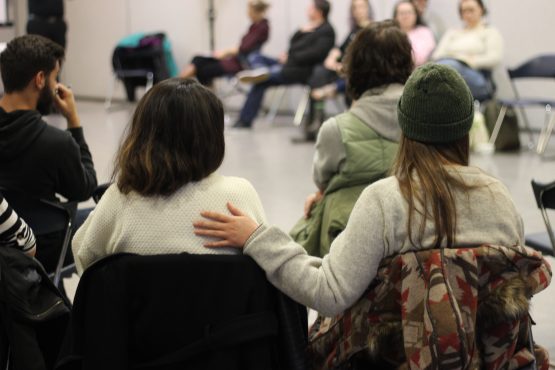
Lilia Zaharieva, left, is comforted by a friend at a UVSS town hall discussing changes to the student society’s health care plan. Photo by Cormac O’Brien, Editor-in-Chief
Lilia Zaharieva is far from giving up her fight for access to Orkambi, the life-altering drug that was taken from her when the UVSS changed their health plan this past summer.
Zaharieva, who suffers from cystic fibrosis, began taking Orkambi approximately a year ago, and it has changed the course of her life. She says that Orkambi provided her with the chance to “plan for her future for the first time ever.”
Unfortunately for Zaharieva, the UVSS switched to the BC Fair PharmaCare plan — a cheaper plan with less coverage. Managed by the provincial government, the new plan does not cover the cost of Orkambi as B.C., along with every other Canadian province, follows the recommendations of the Common Drug Review and the Drug Benefit Council, two panels that judge whether drugs are worth public money. Both say Orkambi is not.
The UVSS has made it clear that the situation is out of their hands. They paid for Zaharieva to have a month’s worth of Orkambi, and they have committed themselves to supporting Zaharieva in her fight to convince the province to cover the cost.
Since then, Zaharieva has been doing all she can to convince B.C.’s health minister Adrian Dix to cover the cost of Orkambi. He has declined to do so, stating that Orkambi has not been sufficiently proven to be successful, despite the fact that all 42 Canadian cystic fibrosis specialists have publicly spoken in favour of Orkambi.
Zaharieva describes the day that Dix finally returned her call as “a very unnerving experience.”
“He called me at a time when I only had a few days left of Orkambi,” she says. “He called me with no warning. I was alone. I thought that he would be willing to give me some empathy or even advice. Instead, he was just misinformed and didn’t seem to be concerned with what I had to say.”
On the Friday before Thanksgiving weekend (three days before she was meant to run out of Orkambi), Zaharieva received a call. It was Dix’s secretary, a woman who only referred to herself as Jas. Jas expressed concern for Zaharieva’s situation and gave her a number to call. Zaharieva says that Jas told her that Dix had spoken to Vertex, the pharmaceutical company that manufactures Orkambi, and the next step was to call a specific phone number.
Full of hope, Zaharieva called the number: it was nothing but the 1-800 help line for Orkambi’s customer support. The representative on the other end had no idea who Zaharieva was. Following this, Cystic Fibrosis Canada confirmed there had been no communication with Dix. Zaharieva’s hope in the government to protect her was dashed.
With Thanksgiving Monday approaching and no short-term solution in sight, Zaharieva attempted to buy a week’s worth of Orkambi out of her own pocket — a purchase that would have come to just over three thousand dollars.
When Zaharieva tried to pay, however, she was told that her cheque would not be cashed as Vertex would give her a 12-week conditional, compassionate supply of Orkambi. Zaharieva, thinking this had been negotiated by Dix, called Jas back, but she says Jas declined that the office had anything to do with the 12-week supply. Zaharieva remains unsure of how or why this occurred, but is not questioning it.
Vertex recently offered to meet with the provincial government to negotiate the price of Orkambi. At the time of writing, Dix has not publicly acted on this offer.
Going forward, Zaharieva continues to fight to convince B.C.’s health ministry of both the validity of her struggles and the power of Orkambi. She has a number of events planned in the future to lobby the government to take action.
On Nov. 18, Zaharieva and representatives from Cystic Fibrosis Canada will be at the UVic Vikes basketball game. She will be speaking at half-time to raise awareness for her cause.
On Nov. 29 at 11:45 a.m. there will also be a rally in front of the Legislative Assembly in Victoria. Zaharieva has invited speakers from all walks of life and users of Orkambi to help convince Dix and the Ministry of Health that Orkambi is life-altering for those suffering from cystic fibrosis. Her hopes for the rally? To be heard.
“I’m really devastated that I haven’t been heard,” Zaharieva says. “I’m coming down to the wire. I’m hoping to feel supported.”
It’s been a whirlwind few months, but Zaharieva, as resilient as ever, will not go down quietly.
“I’ve been gentle in my fight, but I’m not going to give up. I’m not going to be silent. This is the hill I’m willing to die on.”







